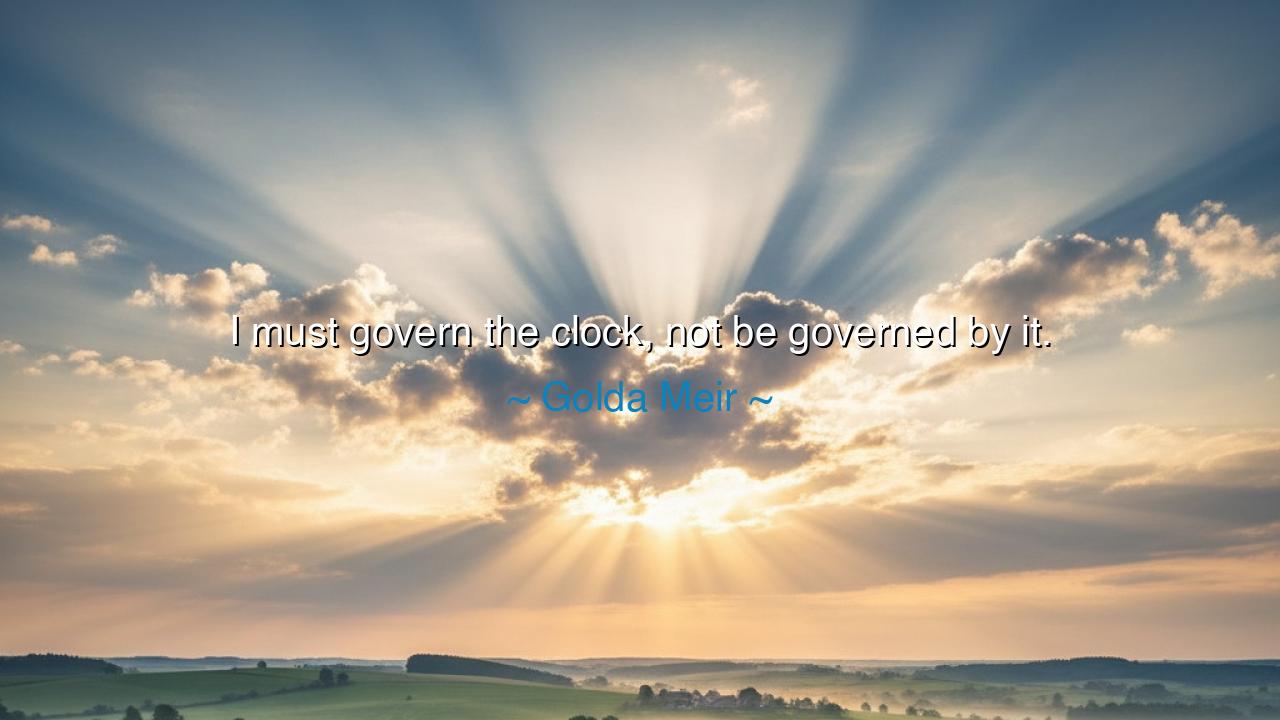
I must govern the clock, not be governed by it.






Golda Meir, the formidable leader and fourth Prime Minister of Israel, once declared: “I must govern the clock, not be governed by it.” In these words she gave voice to a truth as old as the ages—that while time is a relentless master to those who submit, it can become a servant to those who rise with discipline and purpose. To be governed by the clock is to live as a prisoner, running breathlessly after its hands. But to govern the clock is to claim mastery of one’s life, to shape the hours rather than be crushed beneath them.
The origin of this statement lies in Meir’s own life, which was filled with ceaseless burdens and impossible demands. As a woman in leadership during one of the most turbulent eras of her nation’s history, she faced crises, wars, and decisions of staggering consequence. Yet she refused to be enslaved by the tyranny of endless schedules and demands. For her, governing the clock meant choosing what mattered most, giving her energy to what was essential, and refusing to let the ticking of hours dictate her soul’s priorities. Her words were not mere philosophy, but hard-won wisdom from a life lived in the crucible of responsibility.
Consider also the tale of Winston Churchill, who during the dark years of the Second World War governed not only Britain’s armies, but his own hours. While others crumbled beneath the strain of relentless deadlines, Churchill carved his days with intention. He worked deep into the night, napped when his body demanded, and ordered his hours as a commander orders troops. He understood, as Meir did, that in moments of great struggle, to surrender to the clock is to lose control; but to shape one’s hours with courage and foresight is to bend time itself to serve a higher cause.
The deeper meaning of Meir’s words is this: time is not to be feared but to be directed. Many live enslaved by schedules, forever racing, forever lamenting that there are not enough hours in a day. But the truth is that the day is already sufficient—it is the use of it that fails. The one who governs the clock does not ask for more hours, but makes better use of the ones given. It is a call to seize sovereignty over our own existence, to declare that life’s purpose cannot be dictated by the tick of a machine.
The lesson for us is clear: mastery of the clock requires clarity of vision. If you know what matters most, then you will bend your hours toward it. If you scatter your energy upon trifles, the clock will consume you, and you will leave this world with much busyness but little meaning. To govern the clock is to live with intention, to wield time like a sword, cutting away what is unnecessary so that what is essential may shine.
Practically, this means ordering your days not by urgency, but by purpose. Begin with the tasks that give life to your spirit, that serve your destiny, that build your legacy. Guard your mornings, set aside hours for learning, for love, for the labor that fulfills your calling. Do not let the trivial command the throne of your time. Remember that the clock is but a tool, and tools were made to be wielded, not worshiped.
So remember, children of tomorrow: you must govern the clock, not be governed by it. Let your hours serve your vision, not enslave it. Stand above the ticking hands as a king above his subjects. Rule your time with wisdom, courage, and purpose, and it shall serve you well. But if you bow before it, the clock will rule you mercilessly until your days are gone. Therefore rise each morning not as a prisoner of time, but as its master, commanding it in the name of your destiny.






AAdministratorAdministrator
Welcome, honored guests. Please leave a comment, we will respond soon